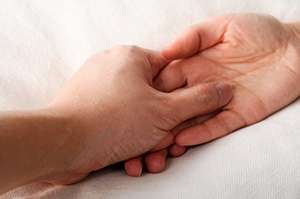Easing cancer's effects through focus on relationships

Cancer patients look to oncology specialists for highly skilled treatment. Yet others may affect their disease experiences – their partners, wives, husbands or close family members.
In recent years, there has been growing recognition that close relationships are important to fostering good cancer care. Treating the whole patient transcends beyond physical medicine to address cancer's psychosocial impact as well, including stresses on partnerships and families.
Psychologist Sharon L. Manne, associate director for population science at the Rutgers Cancer Institute of New Jersey, studies cancer's effect on relationships, especially couples. Her work explores emotional and psychological needs, ways to increase communication and methods of strengthening intimacy between partners.
"Most people don't expect to ever be diagnosed with cancer. Coping is important," Manne says. In her work, she has found that developing more relationship support and intimacy reduces stress and facilitates well-being. "As a research center, our goal is to improve quality of life for patients and families."
Recently, she studied women with early stage breast cancer and their partners. The couples met in groups, facilitated by trained leaders. Some groups focused on one cancer-related issue at each meeting, such as fear of the disease returning or dealing with reactions of friends and family. Other groups were structured to foster couples' communication and stress management skills.

Data drawn from the study are still being analyzed to determine which type of group helped most. Manne notes that these couples' groups were beneficial in unexpected ways, as some couples continued to socialize with each other for years after the study ended.
She is also conducting an ongoing study with prostate cancer patients and their partners, looking at the effects of an intimacy-enhancing therapy. The goal: to see if the approach can improve cancer-related distress, marital dissatisfaction, relationship intimacy and communication.
Manne, who is a professor of medicine and chief of population science at Rutgers Robert Wood Johnson Medical School, has received major research grants from the National Institutes of Health. She has authored many academic publications and a workbook for couples coping with breast cancer.
Her work aims to help couples maintain normalcy in their relationships and "not let cancer take over their lives," she says.
She notes that relationship dynamics between partners can evolve over years before cancer is diagnosed. The couple may have been getting by "with little or no communication because they think they know each other," she explains. As a result, when cancer occurs, partners may have trouble talking about everything from sexual side effects and financial strains to survival worries.
"It's very difficult for couples in long-standing relationships to work through that. She doesn't want to tell him that she worries about him dying because she may upset him. He doesn't want to burden her, so he does not share his sexual functioning concerns," says Manne. "Couples want to protect one another – but our research shows that people do more harm by holding back sharing concerns with one another."
She also studies screening practices among people at risk for cancer due to a family history. She has developed interventions to promote screening acceptance in families of colon cancer patients. These families show a low rate of having recommended tests, despite their higher risk of colon cancer.
"Fear motivates so much of people's behavior. That would be the commonality of what I study across cancer types – fear and anxiety," she says.
Having worked as a psychologist in a pediatric oncology unit at the beginning of her career, she notes that pediatrics used to be the only area in which family issues were considered. Now, she says, for all cancer patients, "doctors are more aware that cancer is a family disease."















